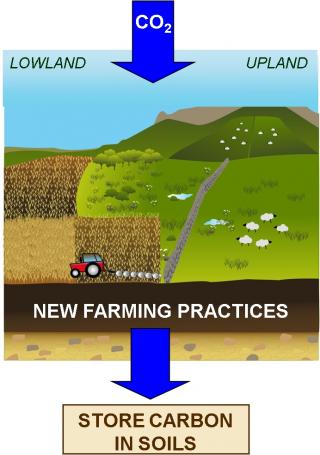The social benefits of reducing outcome-related risk in land-based climate change mitigation
Published on 11 January 2011 in Climate, water and energy

Introduction
There are three principle means of reducing emissions from agriculture: i) reducing emissions; ii) enhancing removals; and iii) displacing emissions. We estimated the benefits associated with enhancement of removals in soils that can be used to determine the socially desirable extent of soil carbon sequestration in Scotland. Benefits of a policy to enhance soil carbon sequestration can be compared to costs for mixes of measures across different regions in Scotland and, theoretically, the desirable extend can be found at the point where marginal benefits meet marginal costs (see Glenk and Colombo, 2010 a).
The conclusions drawn from the results of such an ex-ante benefit-cost-analysis only hold under the assumption that the future delivery of benefits is ensured. Particularly in the environmental sector, however, projects are often characterised by delivery uncertainty. Delivery uncertainty arises from a lack of knowledge to make accurate ex-ante predictions about the expected change in environmental conditions from which benefits arise and are evaluated. In other words, there is a significant risk that benefits will either fail to be delivered in their entirety, or will not accrue at all.
Factors that contribute to risk of failure of a soil carbon sequestration policy are, for example, incomplete or uncertain scientific knowledge about sequestration or mitigation potentials, uncertainties associated with the predictions, and beliefs, about climate change and global warming in general, uncertainties associated with the actual outcome of long-term projects in the face of changes of the political, social and economic environment or uncertainties regarding the actual outcome with respect to farmers’ and land managers’ willingness to participate.
Because delivery uncertainty is mostly neglected, benefits of public environmental programmes are frequently overestimated. This can result in inefficient resource allocation, for example by investing more money into soil carbon sequestration across Scotland than would be socially desirable. Therefore, we explicitly included the risk that a programme aimed at enhanced soil carbon sequestration in Scotland would fail to achieve net emission reductions into the benefit estimation process (Glenk and Colombo, 2010 b).
Key Points
- Willingness to pay (WTP) for reducing delivery uncertainty was found to be substantial.
- At medium levels of failure risk, WTP to reduce net emissions via soil carbon sequestration was estimated to be negative.
- WTP to reduce risk and uncertainty should be conceived by policy makers as a signal to invest more into ways to reduce risk and uncertainty, for example by investing in R&D in this sector.
- Explicitly considering delivery uncertainty for benefit estimation of public environmental programmes offers analysts and decision makers a realistic assessment of how benefits change with uncertainty. Strong assumptions on how to weight risk related to the delivery of benefits can be avoided.
- When delivery of outcomes are expected to be uncertain, delivery uncertainty should therefore be incorporated in stated preference studies aimed at estimating benefits of environmental improvements.
Research Undertaken
We made soil carbon sequestration the subject of a Scotland wide choice experiment survey amongst members of the wider public. Respondents were asked to choose among alternatives of a hypothetical soil carbon programme to reduce net Scottish green house gas emissions that would be funded with a slight increase in tax. The soil carbon programme was additionally described in terms of their outcomes regarding changes of farmland bird habitat (biodiversity) and on-farm employment (rural viability). We accounted for scientific uncertainty by allowing for the possibility that this program may actually fail to deliver climate change mitigation benefits in addition to the program characteristics above and assessed the impact of failure risk on willingness to pay (WTP) for net emission reductions.
Policy Implications
Information regarding the influence of delivery uncertainty on preferences for land-based climate change mitigation should enter considerations on the development of appropriate mitigation strategies. Our study has demonstrated that considering delivery uncertainty can have a potentially large impact on benefit estimation of public programmes with considerable impacts on conclusions drawn from ex-ante cost-benefit analyses. This should be conceived as a signal for policy makers to invest more into reducing the uncertainty associated with land-based mitigation options – in particular soil carbon sequestration – compared to relatively ‘certain’ industrial options, because the marginal benefits of reducing uncertainty are very high.
References
Glenk, K. and S. Colombo (2010 a): Designing policies to mitigate the agricultural contribution to climate change: an assessment of soil based carbon sequestration and its ancillary effects. Climatic Change. doi: 10.1007/s10584-010-9885-7
Glenk, K. and S. Colombo (2010 b): How sure can you be? A framework for considering delivery uncertainty in benefit assessments based on stated preference methods. Journal of Agricultural Economics. doi: 10.1111/j.1477-9552.2010.00278.x
Author
Klaus Glenk (Scottish Agricultural College), Sergio Colombo (IFAPA, Granada, Spain) Klaus.Glenk@sac.ac.uk





